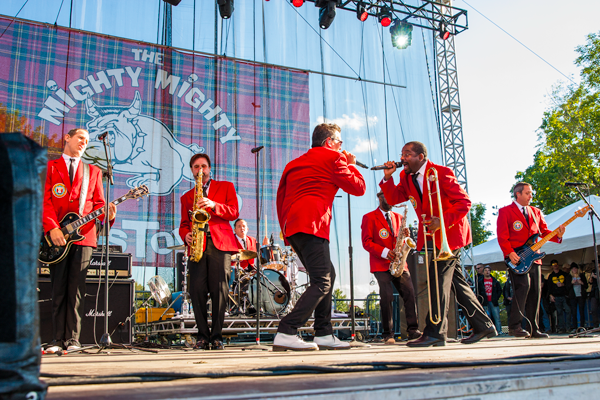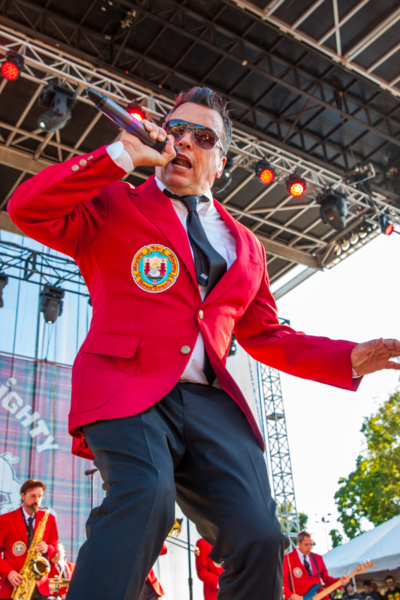
Last week, The Mighty Mighty Bosstones released their ninth studio album, The Magic of Youth. We spoke with singer Dicky Barrett on the day the record came out and discussed the meaning of the album’s title, its recording process and what some of the songs are about. We also talked about the band’s recent performances at Fenway Park with Dropkick Murphys, their upcoming Hometown Throwdown shows at the end of December and more. The Bosstones formed in 1983 and helped define both the ska/punk genre and the third wave ska movement. They enjoyed a considerable amount of mainstream success in the mid ‘90s before announcing a hiatus in late 2003. Four years later they reunited and have remained active ever since. Their new record is one of the strongest and most consistent Bosstones albums to date and will surely please longtime fans. Look for the band to tour as time permits and to continue supporting The Magic of Youth in 2012.
Bill – Tell me about the meaning behind your new album’s title.
Dicky – I think like all of our album titles, it has several different meanings and people can get from it whatever they want to get from it. I think the initial kind of meaning is that although we’re anything but youthful, we’re absolutely very youthful at heart. The band was born and created from our youth. Some of the guys were in high school and their early 20s when we started. Thinking back on it, that’s the only thing that’s kind of magical to me, the fact that The Bosstones were created from that kind of energy and enthusiasm. I think the endurance and longevity of our band comes from the seed that was planted when we were kids. We decided early on that we had each other’s backs and that these were the guys we wanted to go the distance with. For me that’s what the title means, but then I also think that we’re completely trying to be ironic. I also like titles to be ambiguous and I like that it sounds like a Frank Sinatra album. As a writer from Chicago, you know that Sinatra has been there before. I was told that Sinatra liked Chicago better than New York. That’s what I’ve always heard and I don’t blame him. I do too. Not better than Boston, but better than New York. So, I liked that it sounded like a classic, old Sinatra record. Then the song itself, “The Magic of Youth,” is also pretty ironic. It’s a story of a young couple that does very little with their lives, other than get high, stay together and kind of screw up everything. There’s anything but magic in any part of their lives. On top of that, and kind of corniest of all, I’m a father for the first time in my life. You stare at a baby, especially if it’s your baby, and I see nothing but magic.
Bill – That’s really cool. With this being the second album that you’ve released on your own label, what do you like best about putting out your own music?
Dicky – I feel like we’ve always kind of been responsible for it in a way. I don’t ever remember being told anything by any of the labels we ever worked with, whether they were independent or major. I feel like there’s a lot more scrambling and a lot more work this way, but I also feel like there’s a lot less pressure, because we’re going to do what we’re going to do. We’re going to make the product that we want to make and I hate even using the word “product.” Now I sound like a label executive, (laughs). We’re going to make music no matter what, but when there’s other people involved you almost feel like you owe them something or you care about their opinions. On the one hand I didn’t give a shit, but on the other hand, as a person that likes people and gets along with people, I was always interested in pleasing them to a certain extent. That’s gone now and that’s kind of nice. There’s no pressure and you don’t have to please anybody other than yourself and the people that enjoy the music. I like that.
Bill – How would you say that the new record differs from your last album, Pin Points & Gin Joints?
Dicky – With Pin Points…, we wanted it to be ska-heavy. I don’t know why or what we were thinking at the time, but I know there was a conscious effort to put real solid ska grooves in there and pay tribute to the genre in a way that’s respectful. With The Magic of Youth, we kind of wanted to do the same thing with punk, as The Mighty Mighty Bosstones know it. We wanted to get in there and really give that kind of punk energy as far as when punk is at its best and it feels like a sharp pool cue to your gut. That’s what we tried to do and whether we achieved that or not is for anyone to decide, but those were our goals. We also let Pin Points… play out and some of the songs were longer. We wanted The Magic of Youth to be short and concise.
Bill – The record was produced by Ted Hutt, who’s recently worked with The Gaslight Anthem and Dropkick Murphys. What was it like recording with him again?
Dicky – He’s awesome. He’s completely, and I don’t mean to sound corny, but he’s like one of the band members, he really is. He thinks like us, acts like us, works like us and has the same kind of drive. We’ve worked with different producers in the past and for them it was more important to break for lunch, but Ted will just plow right through and only break when he loses perspective. I can’t say enough good things about him. I love the way he works and I love working with him. I think my favorite Mighty Mighty Bosstones producers, and it’s neck and neck, are Paul Kolderie, who was there when the band was born, and Ted Hutt. Ted went from standing next to us, talking about Flogging Molly, or at Rancid shows and other punk shows, to producing our records. He’s one of our buddies, but he’s super-talented. I just thought he was my buddy that wore the hat and had the English accent, (laughs).
Bill – “Like a Shotgun” is one of my favorite songs on the record. What inspired its lyrics?
Dicky – Its lyrics were inspired by my child and the realization of how much you can love something and just how it kind of knocks you over like that. I wanted it to sound like it was either someone being blown away by a shotgun or the realization of the strength and the power of love. It was a real wide distance on some sort of a spectrum, from one end to the other. Musically I think we were inspired by The Jam a little bit on that song as well.
Bill – “Sunday Afternoons on Wisdom Ave.” talks about some of your fondest childhood memories. What made you want to write that song?
Dicky – My sister just texted me and said she was listening to our new album and that she really loved that song. It’s about my father’s childhood home where we used to go and visit my grandparents in Providence, Rhode Island. It’s nothing more than that. I could write three, four, five more versions of that song, it could never end.
Bill – Would you say there’s an overall theme with the lyrics on the album?
Dicky – I think it’s all kind of right this very minute, as far as how we are, who we are and what we are in this time. I was thinking about this earlier and I don’t think we could have made this record five or so years ago. Since I’ve been working at the Jimmy Kimmel Live! show, I’ve been working with a lot of really young and talented people. The writers and Jimmy himself is a really, really smart guy. I think it’s recharged my batteries. I don’t think I could have been as creative lyrically otherwise. It’s not like I’m writing stuff about the TV show, but what it did was creatively allowed me to write better and reach deeper inside myself. Thematically, the lyrics of the record are just right this very minute and deal with the excitement that we have for our band right now.
Bill – That’s awesome. This September you guys played two concerts at Fenway Park with Dropkick Murphys and the Street Dogs. What were those shows like?
Dicky – A dream come true, really. I’ve been going to Fenway Park for as long as I can remember. My father carried me in there when I was a toddler and I’ve been a Red Sox fan my whole life. It was amazing. We’ve been in the park before, the Red Sox have done nice things for us in the past with us being local boys and everything. Just being there, playing there and having the run of the place for two days was great. The way that we were treated was phenomenal and doing it with our pals, The Dropkicks, was a real dream come true for a Boston lad.
Bill – What are you looking forward to regarding your Hometown Throwdown shows at the end of this month?
Dicky – Seeing our supporters, seeing the people up front that love the band and getting the reaction from them regarding our new record. It is our holiday. It’s our Christmas and it’s our celebration, so it’s nice. It’s always a nice way to end the year, but when you’ve had a year like I’ve had it’s a little bit more special.
Bill – Having been a band for almost 30 years, what aspects of writing music and playing shows do you still enjoy most?
Dicky – I would say doing it with my friends. I’ve played a few shows without them and it’s not the same. Doing it with these guys, the guys I got together with when we were kids, and still being around and still caring about them and wanting to hear what they have to say. It’s them, The Bosstones, that’s the best part of it. On top of that, creating stuff that we’re proud of and not just making something where we go, “Alright, let’s see if this garbage flies.” We still have the same passion, the same love and the same conviction for The Mighty Mighty Bosstones. It’s nice to have friends like that.
Bill – What sort of things do The Bosstones have planned for 2012?
Dicky – I don’t know, a nap, (laughs). I could tell you about the year that I’ve had, but I’ll spare you the details. I guess we’re going to go out there and play shows and hit places, as many places as we can, but not as many places as we used to. We’ll play as many places as we currently can and we’ll enjoy ourselves like we have been.










